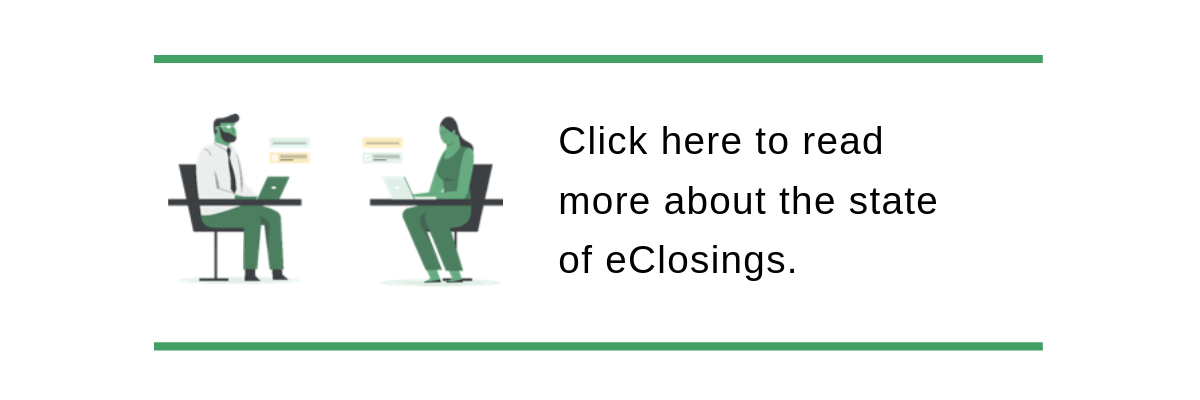For decades, America has ranked as one of the most geographically mobile countries in the world. The average person in the U.S. will move more than 11 times in his or her lifetime. America’s vastness and a common language make moving to a new region easy, but is purchasing a new home across state lines simple? As technology evolves, what could state-to-state migration look like in the future? And are states with high-migration numbers evolving at the speed of change?
State-To-State Migration in the Future
In the majority of real estate transactions today, a homebuyer moving to a new state must navigate closing schedules that require travel or postage delays when hard copies of closing documents are mailed for signatures with a notary.
In the future, this process could be fully-digital. A homebuyer moving to a new state could conduct the closing from the comfort of their home, completing digital signatures online and using a webcam with an eNotary to complete the closing process. In theory, the homebuyer wouldn’t even need to visit the state of their new residence to purchase a home.
This idyllic view of fully-digital closings (online notary eClosings) is still up for debate in terms of its convenience for homebuyers; however, for out-of-state movers the process may sound enticing when considering the full checklist of projects, processes, and to-dos to be completed before a big move.
Over the past year, the future of fully-digital eClosings (online notary eClosings) has dominated industry conversations. Since January of this year, 12 states have passed remote online notarization (RON) legislation — a clear acceleration from the year prior when just 4 states passed RON legislation.
And while the possibility of online notary eClosings relies on more than just the passage of remote online notarization (RON) legislation (more on that later), the passage of RON has been a catalyst for lenders, underwriters, and title & escrow companies to more seriously contemplate eClosings.
Are High-Migration States eNotary-friendly?
According to Deloitte, migration studies indicate that Baby Boomers are frequently moving to Florida and Arizona (8 of the top 10 metro destinations were in these states), Generation Xers are relocating to Texas (5 of the top 10 destinations were in this state), and Millennials are migrating to Colorado and Florida (5 of the top 10 destinations were in these states).
As more out-of-state movers relocate to Florida, Arizona, Texas, and Colorado, these states could face a higher demand for online notary eClosings.
Determining whether these states are equipped to deliver fully-digital closings (online notary eClosings) is not so straight-forward. As we’ve discussed in earlier posts, the accessibility of fully-digital closings relies on a number of factors including the acceptance of eRecorded documents on a county level, the requirements of an underwriter partner (not all underwriters insure e-notarization), and the acceptability of eClosings among lender partners.
Once these factors are accounted for, the remaining piece of the puzzle for fully-digital closings is the availability of RON. This is a state-by-state decision and one that ultimately determines the possibility of an online notary eClosing.

Florida, Arizona, and Texas have all authorized RON; however, the law will not take effect until 2020 for Arizona and Florida. In Colorado, RON legislation is still “active” with a Remote Online Notary Act most recently passing through the house but stalling before reaching the governor’s desk.

Are eNotary Closings Actually Desired Among Interstate Homebuyers?
Online notary eClosings pose conveniences that might be appealing for an out-of-state homebuyer including:
- Simplified coordination: in traditional “wet” closings, in-person digital eClosings, and hybrid eClosings, a homebuyer must coordinate with a notary to sign documents in their presence. This coordination is simplified with RON and eliminates any travel requirements.
- Shorter closing timelines: digital signings allow homebuyers to review and sign documents on their own time without printing or scanning. Additionally, digital signings eliminate the need for postage delays (in the case of traditional “wet” closings which require physical documents to be sent for signatures in the presence of a Notary Public).
- Reduced costs: Tighter timelines help interstate homebuyers better plan their move with a greater reassurance that their new home will be theirs on their move date. This eliminates any storage fees or temporary housing costs.
- Security: during the closing process, homebuyers must provide highly-sensitive information including account details, social security numbers, and other personal information. With secure digital channels, homebuyers can instantly send documents without worry of someone intercepting documents sent in the mail.
While online notary eClosings are certainly convenient, the simplicity of these types of closings is still up for debate. Many homebuyers struggle to navigate closing documents and often need in-person consultation to confidently close on a new home. Fully-digital closings eliminate the face-to-face interactions that can help homebuyers understand the process and the value of title insurance.
What’s Next?
The reality of fully-digital closings is crystalizing as more states move RON legislation forward; however, the value of online notary eClosings for out-of-state homebuyers is mostly unknown. Regardless of where our digital future leads, title companies that lay a digital foundation and start exploring eClosings now will come out ahead in the future. To learn more about what you can do to get started with eClosings, read what eClosing expert, Jim O’Donnell recommends by clicking below.



